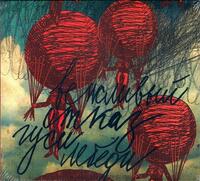This Moscow sextet’s 2010 album is truly unique and excitingly unpredictable. Polite Refusal (aka Vezhlivy Otkaz) have been around since the mid-'80s Soviet years. Now led by singer/guitarist/composer (and original member) Roman Suslov, they release albums infrequently -- their last arrived over seven years before this one. On the evidence of Geese and Swans (aka Gusi-Lebedi), it was well worth the wait. In the English-language liners of the edition distributed outside of Russia by AltrOck, writer Dmitry Ukhov says the band often performs "art songs rather than just songs," avoiding "the verse/refrain formula," but one might argue that's not really the case here. Suslov does sing verses and refrains, a structure that's not exactly groundbreaking, but even when the music doesn't stretch boundaries, his vocal delivery avoids the routine. He's a forceful, even riveting frontman (and killer guitarist on amplified acoustic), his voice capable of descending from a rocked-up tenor to a bluesy baritone, alternatingly melodic and declamatory, grainy and rough around the edges in perfect measure. He sings in strongly inflected Russian -- obviously incomprehensible for those who don't understand the language, but just the sound of his voice is enough to carry the day. And yet it's Suslov's music beyond the verses and refrains that truly elevates Geese and Swans. Of course, countless groups have used rock song forms to launch extended instrumental excursions -- prog rockers and jam bands have been plying such territory for decades. But rarely, if ever, quite like this.
Take "Road Song," for example. (Simply titled songs like the opening and closing instrumentals "March" and "Etude," along with "Road Song" and other numbers like "Blues" and "Time," almost present themselves as archetypes with an avant Russian spin.) After Suslov sings and picks his way through the indeed roadworthy intro, the song explodes. Suslov's guitar and Dmitry Shumilov's upright electric bass maintain the propulsion with an off-kilter ostinato line, while drummer Mikhail Mitin tumbles in free-bop mode, violinist Sergey Ryzhenko interjects pizzicato embellishments, and trumpeter Andrey Solovyov goes wild. It's almost as if the band has split apart, but pianist Pavel Karmanov -- harmonically and structurally adventurous à la Myra Melford throughout the disc -- links it all together with octaves that fragment and echo the tune's theme, and when the piano appears, Solovyov manages to interject responses into his own high-flying trumpet flurries. Then the band is suddenly back to the tune's beginning and the listener is left wondering how, through all of that, a tenuous thread of continuity was maintained. Elsewhere, the band tips more toward Russian folk and even blues-tinged avant-prog than avant jazz, more incisive and less improvisational than jazz and earthier than prog rock -- a better fit, perhaps, at a Rock in Opposition festival than a jazz festival (although kudos to any jazzfest that would manage to book them). The most immediately engaging tunes -- "Murka" and "Time," for example -- have a groove and momentum that won't let go, but even during the knottiest digressions from Suslov's core songs, the group's sheer musicality should demand and receive the respect of any open-minded music listener. ("Suffering" -- with Karmanov on flute -- hews uncomfortably close to Jethro Tull, but nobody’s perfect.) What is this, then? A Russian folk-jazz-rock mash-up of King Crimson and Dave Douglas? Whatever it is, find this disc and prepare to be astounded.
